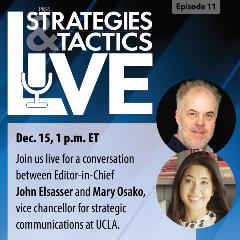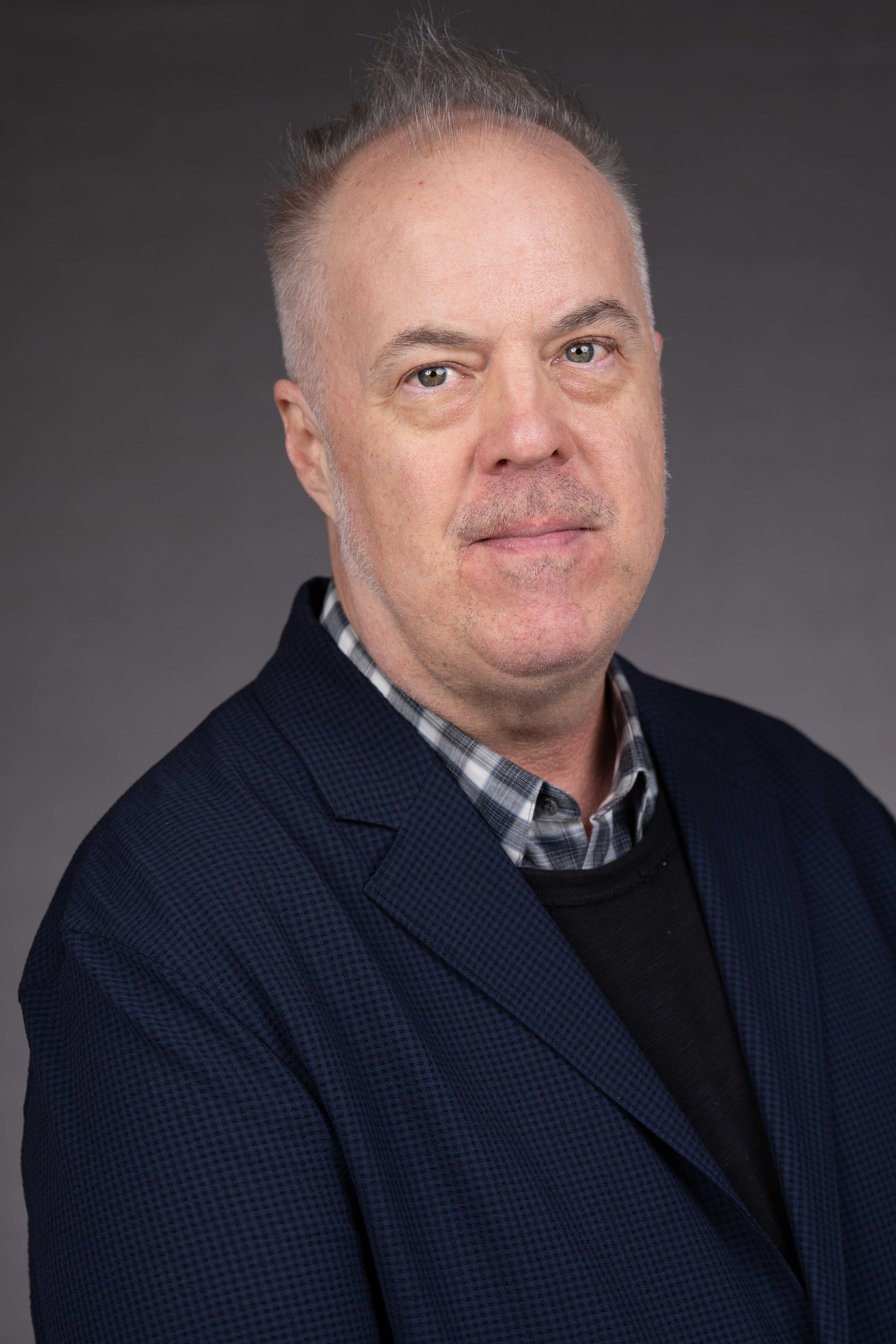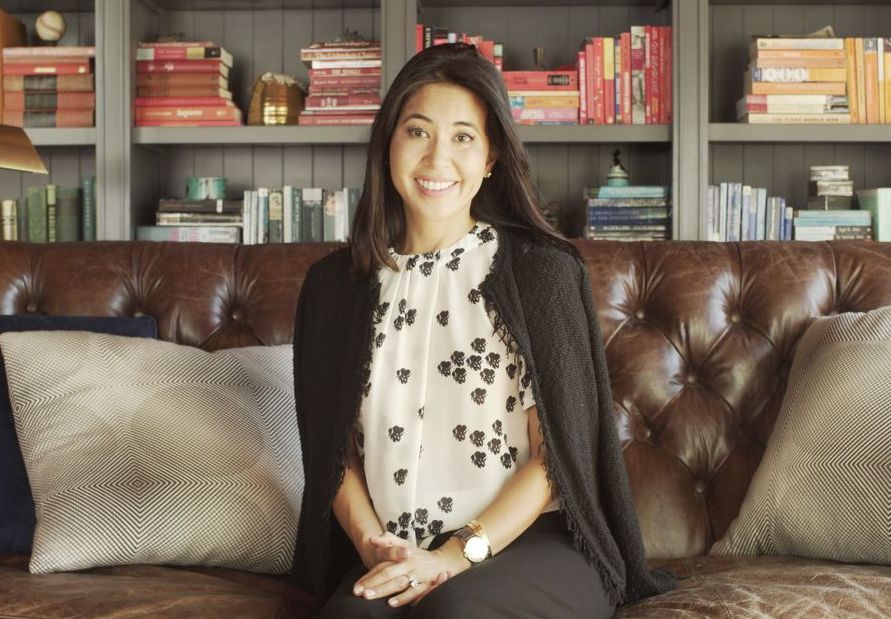UCLA’s Top Communicator on Being a Leader Today
By John Elsasser
November-December 2022
Mary Osako has led communications for Fortune 500 companies in the media, technology and entertainment industries.
In September 2019, UCLA named her the first vice chancellor for strategic communications, which oversees the university’s marketing, media relations, executive communications, public outreach and special events and protocol units.
She was previously CCO of Activision Blizzard (2014-17); head of global corporate communications at Amazon (2009-14); and vice president of corporate, international and public policy communications at Yahoo (2000-07).
Her hiring at UCLA was a homecoming of sorts as she graduated from the school in 1996.
On a recent Zoom call, Osako discussed her alma mater, making the transition from manager to leader and the obstacles women face in the corporate world today.
You earned your bachelor’s degree in psychology, with a specialization in Asian American studies, from UCLA. How did your transition to comms come about?
I was born and bred in L.A., and grew up about two freeway exits from UCLA. It was my dream school. And more important, it was my dad’s dream school for me. I’m a first-generation college grad. My dad cleaned pools. And my mom worked as a sushi maker at a local supermarket here.
And when I went to UCLA, I’ll be honest: I had no idea about the communications field or public relations. If it wasn’t something science-based, it didn’t exist in the culture and the family that I grew up in. I am Japanese American. And I’m bilingual.
I remember working at a Japanese airline as an admin assistant and reading a story about a UCLA alumna who was also Japanese American. She was a speechwriter for then-Senator of Hawaii Daniel Inouye. I remember connecting with her and thinking I liked writing.
It was the late 1990s. I started reading all the PR trades religiously, any I could get my hands onto, to read if there was a place for me there and how I would go about finding a job. I got what became my first PR job, which was at a PR firm. From then on, I worked for Sprint and then got recruited over to Yahoo. It was a phenomenal place for someone like me, who was on the younger side without much experience. But I had a lot of passion. I had an intense work ethic. And I went on that trajectory from there.
What milestone most shaped your career?
At Sprint, I had a job called “PR Analyst.” No one knew what it was. It was an inaugural role. At the office, I was the first one in, the last one out. My whole job was to read all the papers around LA County and to do an analysis and see how we might get into the news. I did everything I could to try and conform to what I thought [the VP] meant by a leader.
I started dressing differently and telling less jokes. I was promoted quickly at whatever companies I went to. But it took a personal toll, thinking that’s who I had to be.
And it wasn’t until I was in my 30s that I remember deciding, “You know what? I’m just going to try and be myself a little bit, bring the jokes, talk about my personal life.” That is when my career ascended to where I liked it. So, I would say that was a pivotal moment for me.
What impact has UCLA had on your life?
UCLA changed the personal trajectory of my life. I would go as far as to say that my experiences and the relationships that I formed at UCLA saved my life in a lot of pivotal moments. My best friends today were my college roommates back then, later my bridesmaids and now aunts to my twin boys. They remain my lifelines.
My dad was carjacked when I was a junior at UCLA. I remember having to take time off, going around to my professors, and asking for incompletes. I looked probably as good as I felt. And I remember them caring about how I was more than about anything academically. I remember the student affairs team helping me through and reaching out to me and making sure that I was supported. UCLA was this change agent for me. And I’m entirely indebted to it.
How can PR pros graduate from being managers to leaders?
I first managed people when I worked at Yahoo. I had zero experience and zero training. But I loved the art of communications. My boss elevated me to this job of vice president of international policy and communications. And I was not qualified for it at the time. It was a sign of the times, of being promoted before I was trained or ready. Maybe that was the speed at which the internet was growing back then. Everyone I managed was older than me.
Understanding leadership means knowing that the soft-skills component is even more important than hard skills. For me, the soft-skills side tended to get an afterthought. And it was later in my leadership experience that I realized it was much more important.
What obstacles have you seen women leaders face and overcome?
I think we’re seeing it even more pronounced during COVID and post-COVID. Women executives and women in the workplace are significantly more impacted than their male counterparts. One in four women considered leaving the workforce [during the pandemic] so they could take care of their personal lives, versus one in five men.
In the corporate world, women may choose not to go for another position because there’s so much turmoil in our home life.
What are some practical ways for leaders to acknowledge their employees?
Showing vulnerability is so scary and yet powerful, from my perspective — where it allows leaders to create space for others who might be enduring some of the same challenges. And there’s something comforting about that.
For the people managers on my team, you are spending a lot of energy doing the work. You’re also expending a lot of emotional energy, making sure, checking in and talking about how people are doing. And so, in two weeks, I’m having a self-care day for the people managers on my team.
I would say showing vulnerability and showing empathy for people all around us is important, more maybe now than ever. And then for people managers, [it’s] tangible things. You know when you’re on an airplane, and they say, “Put the mask on yourself first,” so that you can then put it on others? I feel like that for people managers right now.
What’s the best leadership advice you have ever received?
It doesn’t matter if you’re the loudest voice in the room. What matters is whether you are the most truthful voice. And I lean on that quite a bit. I don’t have a very loud voice.
I always joke with my husband, who has a great face for TV, and an incredible voice for podcasts and anything that is audio. It’s booming. And that’s not something that I naturally have.
But I can come with the truth, as hard as that can be to muster up. I know how to do that. And I feel courageous enough to be that voice in the room these days. Because first and foremost, it’s my obligation in being in a role like this. That’s the leadership advice I take with me.




